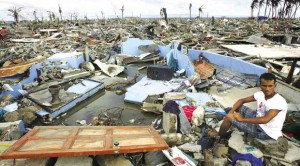
‘YOLANDA’ SURVIVOR Melvin Castro sits in the rubble of his home in Tacloban City where 18 of his family members were killed. INQUIRER FILE PHOTO/RAFFY LERMA
MANILA, Philippines—The “grim climate forecast for Southeast Asia” by a recent United Nations report on climate change must prod the government to improve adaptation and mitigation efforts in the face of calamities like Super Typhoon Yolanda (international name: Haiyan), according to at least three civil society groups.
The groups said the Aquino government must heed dire warnings cited in the Intergovernmental Panel on Climate Change’s (IPCC) Working Group II Report on Impacts, Vulnerability and Adaptation, which analyzed future risks from the changing climate, among other things.
At a press conference on Friday, Aksyon Klima Pilipinas, Greenpeace and Oxfam expressed grave concern about the scenarios presented in the report and proposed ways the government could respond.
The three groups urged the Aquino administration to take the first step by allocating funds for the People’s Survival Fund (PSF), which, by law, should finance the adaptation plans of local government units (LGUs).
Adaptation plans include setting up early warning systems and contingency planning for extreme weather events such as droughts and floods, the groups said.
The organizations also renewed their call on governments across the world, particularly developed countries, to “honor their responsibility and commit to scale up their adaptation and mitigation actions.”
“But after Yolanda, we also need to adapt to the best of our own abilities and empower communities so they can be more climate-resilient,” the three groups said.
“Beyond the PSF, both disaster risk reduction and climate change adaptation should already be incorporated in the post-Yolanda rehabilitation plan, and then into longer-term national and local development plans and budgets,” Melvin Purzuelo, convenor of Aksyon Klima Pilipinas, said.
“The IPCC report however states that adaptation is not enough. We therefore need to integrate adaptation with mitigation strategies, such as transitioning to renewable energy systems,” said Amalie Obusan, regional climate and energy campaigner of Greenpeace Southeast Asia.
On the PSF, Justin Morgan, Oxfam country director, added: “Congress must allocate at least P1 billion to the People’s Survival Fund as mandated by law. President Aquino must also sign the revised Implementing Rules and Regulations of the Climate Change Act to make the fund operational.”
“As a highly vulnerable country, extreme weather events are now our new normal, and we need to take concrete measures to literally survive,” the groups added.
The IPCC is the international body for assessing the science related to climate change.
It was set up in 1988 by the World Meteorological Organization and the United Nations Environment Program to provide policymakers with regular assessments of the scientific basis of climate change, its impacts and future risks, and options for adaptation and mitigation.
The IPCC Working Group II’s contribution to the Fifth Assessment Report (AR5), released last March 31 and titled “Climate Change 2014: Impacts, Adaptation, and Vulnerability,” details the impacts of climate change to date, the future risks from changing climate, and the opportunities for effective action to reduce risks.
A total of 309 coordinating lead authors and review editors drawn from 70 countries were selected to produce the report. They enlisted the help of 436 contributing authors, and a total of 1,729 expert and government reviewers, including five Filipinos who contributed in the writing and editing.
They were Juan Pulhin and Felino Lansigan from the University of the Philippines-Los Baños), Lourdes Tibig (independent), Rodel Lasco from the World Agroforestry Center), and Rosa Perez from the Manila Observatory.
RELATED STORIES
Climate change boosts conflict risk, flood, hunger–UN
Environmentalist group says PH needs to improve climate change policy